NUR2102 - Medication Management Assignment: Case Study Analysis
VerifiedAdded on 2022/09/26
|7
|1647
|21
Report
AI Summary
This report presents a comprehensive analysis of a medication management assignment based on a case study of a 63-year-old male patient, Mr. Hadden, suffering from chronic obstructive pulmonary disease (COPD). The assignment, completed for NUR2102 at the University of Southern Queensland, focuses on the critical role of nurses in ensuring effective self-management of medications. The report begins with a detailed discussion of the patient's situation, including his medical history, current medications, and vital signs, which indicate worsening COPD symptoms. It then identifies key problems, such as non-adherence to medication and smoking habits, and establishes nursing goals aimed at improving the patient's understanding of his condition, promoting a healthier lifestyle, and developing a medication routine. The report outlines specific interventions and strategies, including patient education, medication synchronization, and routine follow-ups, to enhance medication self-management. The evaluation of outcomes, based on patient self-reporting and changes in health, is also discussed. The assignment emphasizes the importance of a therapeutic relationship between nurses and patients to achieve positive health outcomes, particularly in cases where patients may be resistant to treatment. The report concludes by reinforcing the significance of nurses in developing and implementing strategies to improve medication self-management for better patient care.
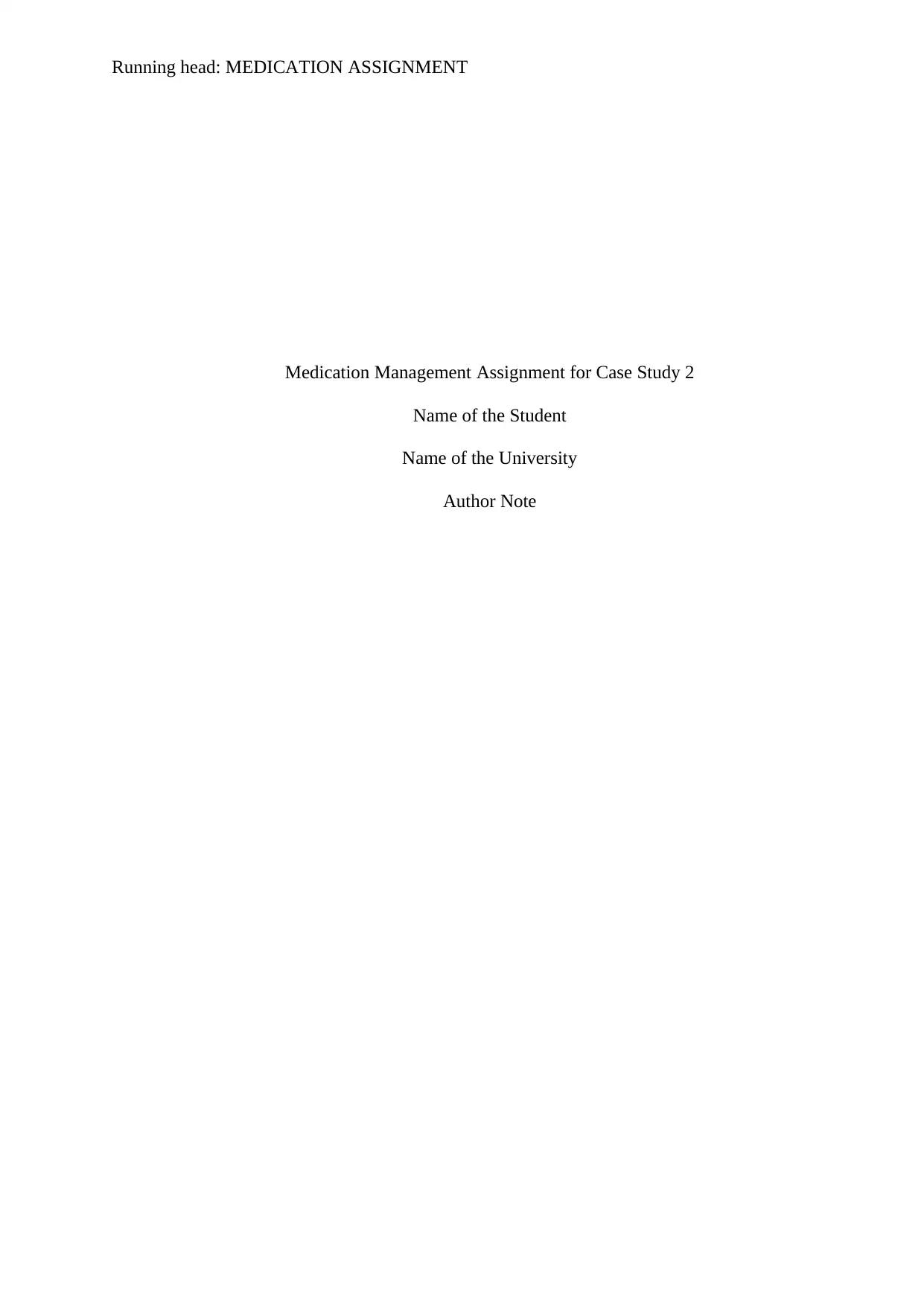
Running head: MEDICATION ASSIGNMENT
Medication Management Assignment for Case Study 2
Name of the Student
Name of the University
Author Note
Medication Management Assignment for Case Study 2
Name of the Student
Name of the University
Author Note
Paraphrase This Document
Need a fresh take? Get an instant paraphrase of this document with our AI Paraphraser
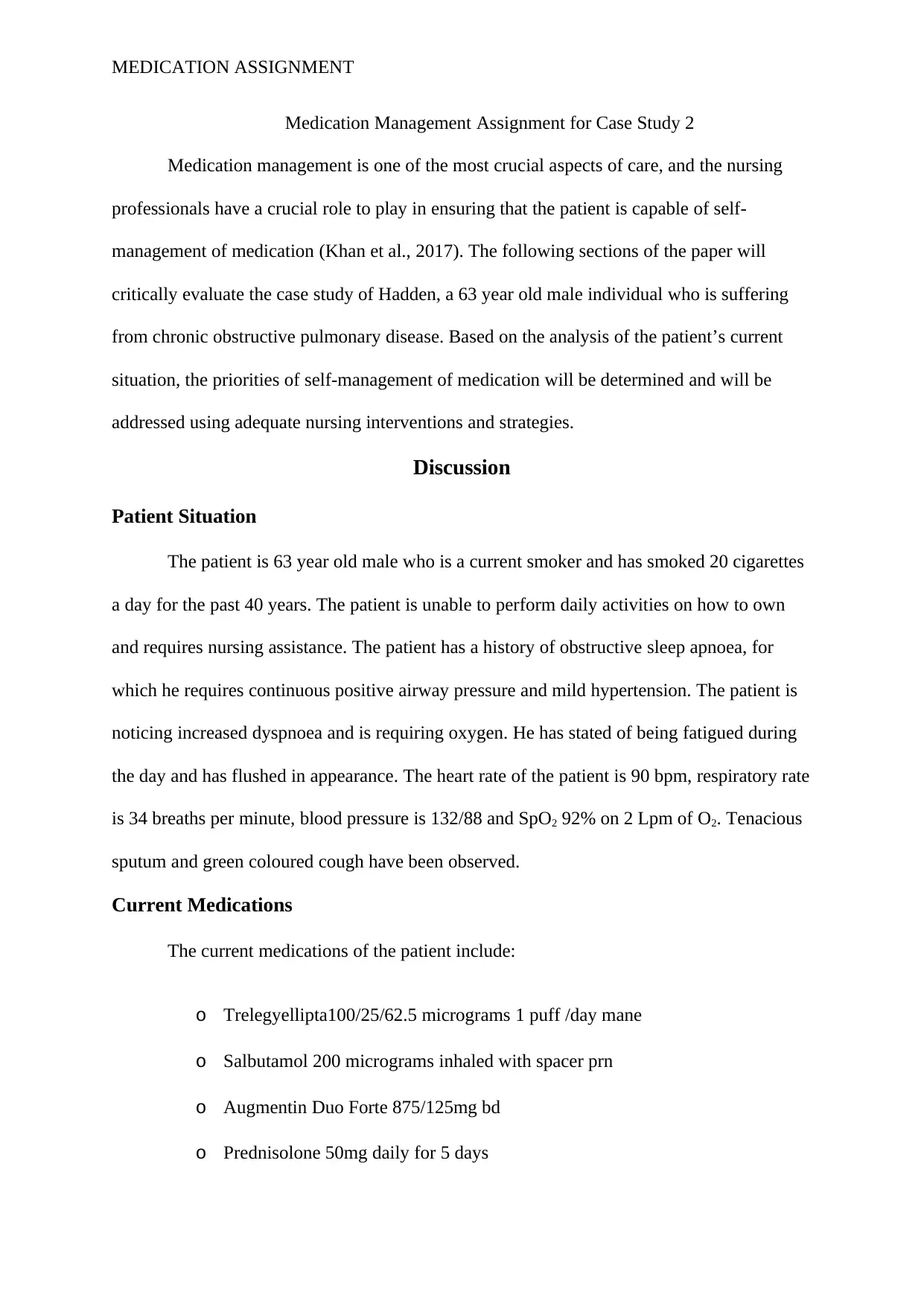
MEDICATION ASSIGNMENT
Medication Management Assignment for Case Study 2
Medication management is one of the most crucial aspects of care, and the nursing
professionals have a crucial role to play in ensuring that the patient is capable of self-
management of medication (Khan et al., 2017). The following sections of the paper will
critically evaluate the case study of Hadden, a 63 year old male individual who is suffering
from chronic obstructive pulmonary disease. Based on the analysis of the patient’s current
situation, the priorities of self-management of medication will be determined and will be
addressed using adequate nursing interventions and strategies.
Discussion
Patient Situation
The patient is 63 year old male who is a current smoker and has smoked 20 cigarettes
a day for the past 40 years. The patient is unable to perform daily activities on how to own
and requires nursing assistance. The patient has a history of obstructive sleep apnoea, for
which he requires continuous positive airway pressure and mild hypertension. The patient is
noticing increased dyspnoea and is requiring oxygen. He has stated of being fatigued during
the day and has flushed in appearance. The heart rate of the patient is 90 bpm, respiratory rate
is 34 breaths per minute, blood pressure is 132/88 and SpO2 92% on 2 Lpm of O2. Tenacious
sputum and green coloured cough have been observed.
Current Medications
The current medications of the patient include:
o Trelegyellipta100/25/62.5 micrograms 1 puff /day mane
o Salbutamol 200 micrograms inhaled with spacer prn
o Augmentin Duo Forte 875/125mg bd
o Prednisolone 50mg daily for 5 days
Medication Management Assignment for Case Study 2
Medication management is one of the most crucial aspects of care, and the nursing
professionals have a crucial role to play in ensuring that the patient is capable of self-
management of medication (Khan et al., 2017). The following sections of the paper will
critically evaluate the case study of Hadden, a 63 year old male individual who is suffering
from chronic obstructive pulmonary disease. Based on the analysis of the patient’s current
situation, the priorities of self-management of medication will be determined and will be
addressed using adequate nursing interventions and strategies.
Discussion
Patient Situation
The patient is 63 year old male who is a current smoker and has smoked 20 cigarettes
a day for the past 40 years. The patient is unable to perform daily activities on how to own
and requires nursing assistance. The patient has a history of obstructive sleep apnoea, for
which he requires continuous positive airway pressure and mild hypertension. The patient is
noticing increased dyspnoea and is requiring oxygen. He has stated of being fatigued during
the day and has flushed in appearance. The heart rate of the patient is 90 bpm, respiratory rate
is 34 breaths per minute, blood pressure is 132/88 and SpO2 92% on 2 Lpm of O2. Tenacious
sputum and green coloured cough have been observed.
Current Medications
The current medications of the patient include:
o Trelegyellipta100/25/62.5 micrograms 1 puff /day mane
o Salbutamol 200 micrograms inhaled with spacer prn
o Augmentin Duo Forte 875/125mg bd
o Prednisolone 50mg daily for 5 days
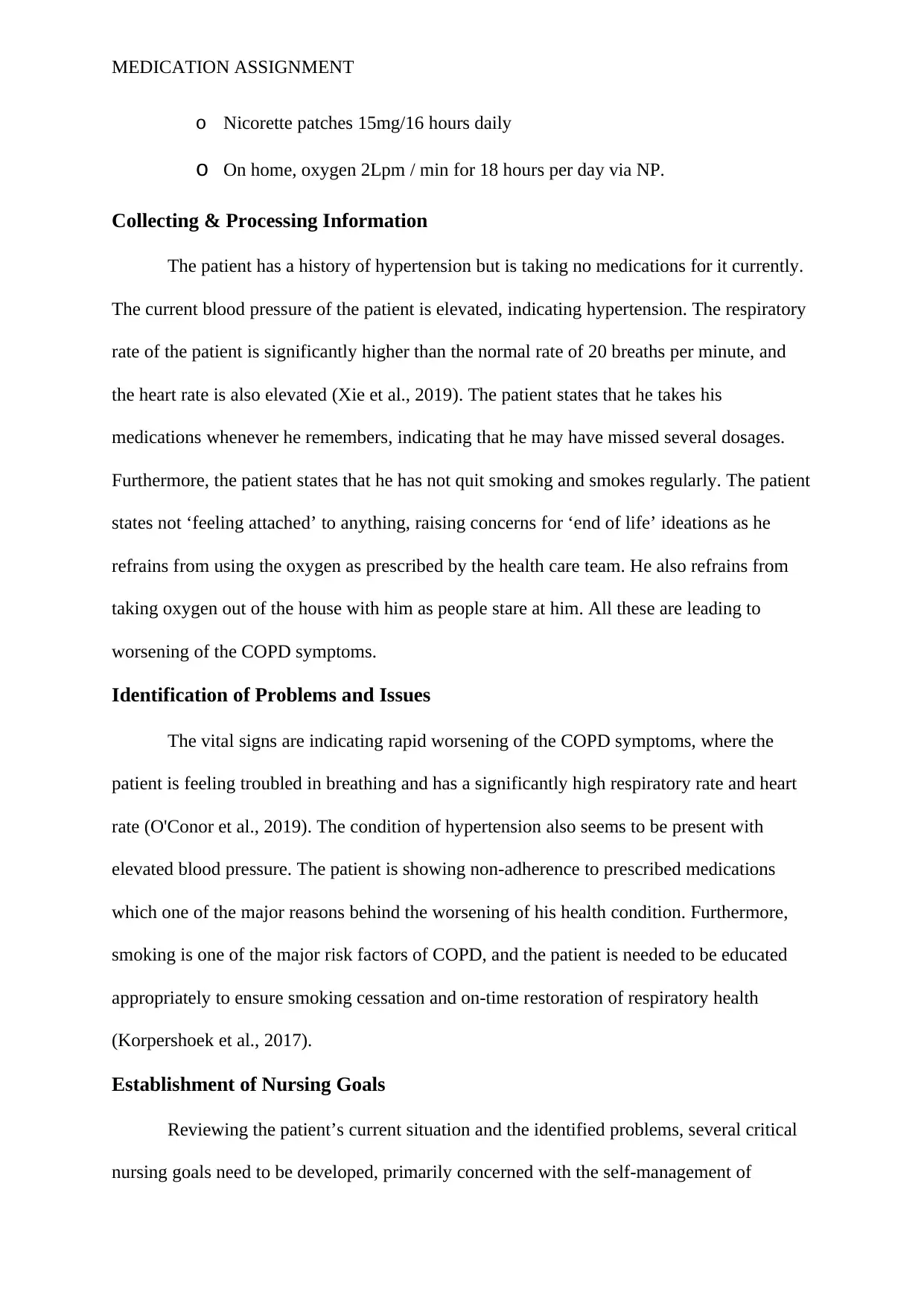
MEDICATION ASSIGNMENT
o Nicorette patches 15mg/16 hours daily
o On home, oxygen 2Lpm / min for 18 hours per day via NP.
Collecting & Processing Information
The patient has a history of hypertension but is taking no medications for it currently.
The current blood pressure of the patient is elevated, indicating hypertension. The respiratory
rate of the patient is significantly higher than the normal rate of 20 breaths per minute, and
the heart rate is also elevated (Xie et al., 2019). The patient states that he takes his
medications whenever he remembers, indicating that he may have missed several dosages.
Furthermore, the patient states that he has not quit smoking and smokes regularly. The patient
states not ‘feeling attached’ to anything, raising concerns for ‘end of life’ ideations as he
refrains from using the oxygen as prescribed by the health care team. He also refrains from
taking oxygen out of the house with him as people stare at him. All these are leading to
worsening of the COPD symptoms.
Identification of Problems and Issues
The vital signs are indicating rapid worsening of the COPD symptoms, where the
patient is feeling troubled in breathing and has a significantly high respiratory rate and heart
rate (O'Conor et al., 2019). The condition of hypertension also seems to be present with
elevated blood pressure. The patient is showing non-adherence to prescribed medications
which one of the major reasons behind the worsening of his health condition. Furthermore,
smoking is one of the major risk factors of COPD, and the patient is needed to be educated
appropriately to ensure smoking cessation and on-time restoration of respiratory health
(Korpershoek et al., 2017).
Establishment of Nursing Goals
Reviewing the patient’s current situation and the identified problems, several critical
nursing goals need to be developed, primarily concerned with the self-management of
o Nicorette patches 15mg/16 hours daily
o On home, oxygen 2Lpm / min for 18 hours per day via NP.
Collecting & Processing Information
The patient has a history of hypertension but is taking no medications for it currently.
The current blood pressure of the patient is elevated, indicating hypertension. The respiratory
rate of the patient is significantly higher than the normal rate of 20 breaths per minute, and
the heart rate is also elevated (Xie et al., 2019). The patient states that he takes his
medications whenever he remembers, indicating that he may have missed several dosages.
Furthermore, the patient states that he has not quit smoking and smokes regularly. The patient
states not ‘feeling attached’ to anything, raising concerns for ‘end of life’ ideations as he
refrains from using the oxygen as prescribed by the health care team. He also refrains from
taking oxygen out of the house with him as people stare at him. All these are leading to
worsening of the COPD symptoms.
Identification of Problems and Issues
The vital signs are indicating rapid worsening of the COPD symptoms, where the
patient is feeling troubled in breathing and has a significantly high respiratory rate and heart
rate (O'Conor et al., 2019). The condition of hypertension also seems to be present with
elevated blood pressure. The patient is showing non-adherence to prescribed medications
which one of the major reasons behind the worsening of his health condition. Furthermore,
smoking is one of the major risk factors of COPD, and the patient is needed to be educated
appropriately to ensure smoking cessation and on-time restoration of respiratory health
(Korpershoek et al., 2017).
Establishment of Nursing Goals
Reviewing the patient’s current situation and the identified problems, several critical
nursing goals need to be developed, primarily concerned with the self-management of
⊘ This is a preview!⊘
Do you want full access?
Subscribe today to unlock all pages.

Trusted by 1+ million students worldwide
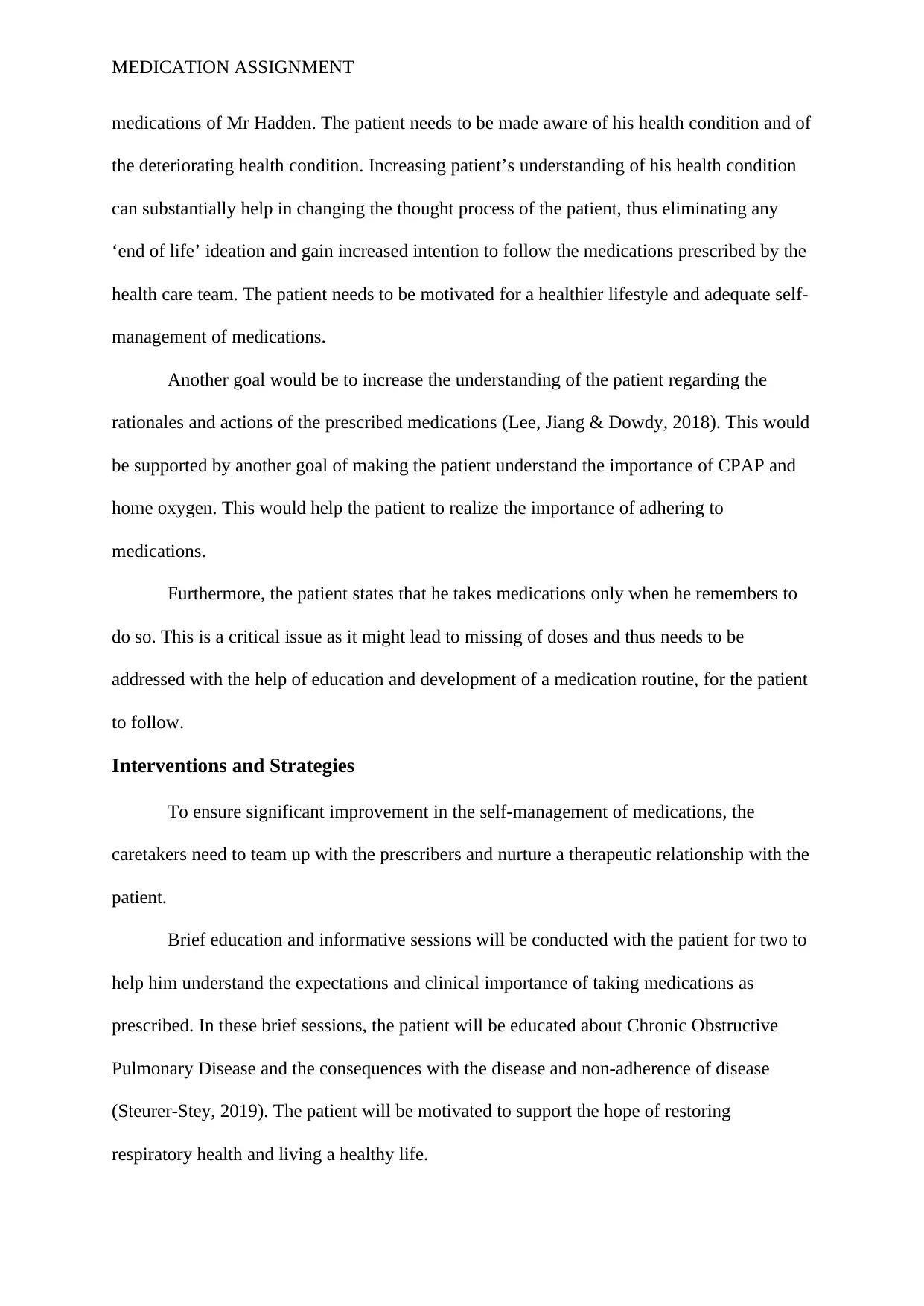
MEDICATION ASSIGNMENT
medications of Mr Hadden. The patient needs to be made aware of his health condition and of
the deteriorating health condition. Increasing patient’s understanding of his health condition
can substantially help in changing the thought process of the patient, thus eliminating any
‘end of life’ ideation and gain increased intention to follow the medications prescribed by the
health care team. The patient needs to be motivated for a healthier lifestyle and adequate self-
management of medications.
Another goal would be to increase the understanding of the patient regarding the
rationales and actions of the prescribed medications (Lee, Jiang & Dowdy, 2018). This would
be supported by another goal of making the patient understand the importance of CPAP and
home oxygen. This would help the patient to realize the importance of adhering to
medications.
Furthermore, the patient states that he takes medications only when he remembers to
do so. This is a critical issue as it might lead to missing of doses and thus needs to be
addressed with the help of education and development of a medication routine, for the patient
to follow.
Interventions and Strategies
To ensure significant improvement in the self-management of medications, the
caretakers need to team up with the prescribers and nurture a therapeutic relationship with the
patient.
Brief education and informative sessions will be conducted with the patient for two to
help him understand the expectations and clinical importance of taking medications as
prescribed. In these brief sessions, the patient will be educated about Chronic Obstructive
Pulmonary Disease and the consequences with the disease and non-adherence of disease
(Steurer-Stey, 2019). The patient will be motivated to support the hope of restoring
respiratory health and living a healthy life.
medications of Mr Hadden. The patient needs to be made aware of his health condition and of
the deteriorating health condition. Increasing patient’s understanding of his health condition
can substantially help in changing the thought process of the patient, thus eliminating any
‘end of life’ ideation and gain increased intention to follow the medications prescribed by the
health care team. The patient needs to be motivated for a healthier lifestyle and adequate self-
management of medications.
Another goal would be to increase the understanding of the patient regarding the
rationales and actions of the prescribed medications (Lee, Jiang & Dowdy, 2018). This would
be supported by another goal of making the patient understand the importance of CPAP and
home oxygen. This would help the patient to realize the importance of adhering to
medications.
Furthermore, the patient states that he takes medications only when he remembers to
do so. This is a critical issue as it might lead to missing of doses and thus needs to be
addressed with the help of education and development of a medication routine, for the patient
to follow.
Interventions and Strategies
To ensure significant improvement in the self-management of medications, the
caretakers need to team up with the prescribers and nurture a therapeutic relationship with the
patient.
Brief education and informative sessions will be conducted with the patient for two to
help him understand the expectations and clinical importance of taking medications as
prescribed. In these brief sessions, the patient will be educated about Chronic Obstructive
Pulmonary Disease and the consequences with the disease and non-adherence of disease
(Steurer-Stey, 2019). The patient will be motivated to support the hope of restoring
respiratory health and living a healthy life.
Paraphrase This Document
Need a fresh take? Get an instant paraphrase of this document with our AI Paraphraser
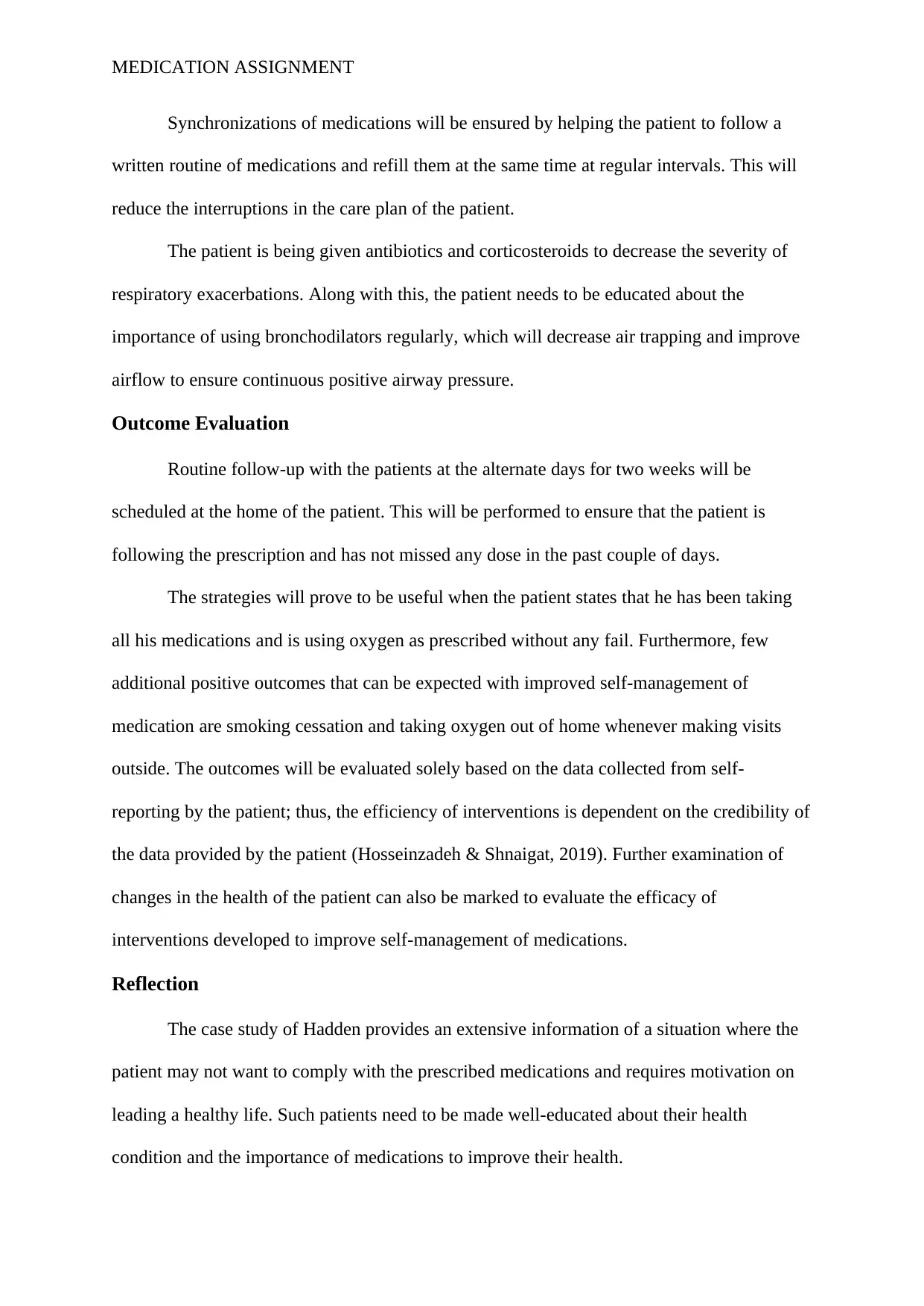
MEDICATION ASSIGNMENT
Synchronizations of medications will be ensured by helping the patient to follow a
written routine of medications and refill them at the same time at regular intervals. This will
reduce the interruptions in the care plan of the patient.
The patient is being given antibiotics and corticosteroids to decrease the severity of
respiratory exacerbations. Along with this, the patient needs to be educated about the
importance of using bronchodilators regularly, which will decrease air trapping and improve
airflow to ensure continuous positive airway pressure.
Outcome Evaluation
Routine follow-up with the patients at the alternate days for two weeks will be
scheduled at the home of the patient. This will be performed to ensure that the patient is
following the prescription and has not missed any dose in the past couple of days.
The strategies will prove to be useful when the patient states that he has been taking
all his medications and is using oxygen as prescribed without any fail. Furthermore, few
additional positive outcomes that can be expected with improved self-management of
medication are smoking cessation and taking oxygen out of home whenever making visits
outside. The outcomes will be evaluated solely based on the data collected from self-
reporting by the patient; thus, the efficiency of interventions is dependent on the credibility of
the data provided by the patient (Hosseinzadeh & Shnaigat, 2019). Further examination of
changes in the health of the patient can also be marked to evaluate the efficacy of
interventions developed to improve self-management of medications.
Reflection
The case study of Hadden provides an extensive information of a situation where the
patient may not want to comply with the prescribed medications and requires motivation on
leading a healthy life. Such patients need to be made well-educated about their health
condition and the importance of medications to improve their health.
Synchronizations of medications will be ensured by helping the patient to follow a
written routine of medications and refill them at the same time at regular intervals. This will
reduce the interruptions in the care plan of the patient.
The patient is being given antibiotics and corticosteroids to decrease the severity of
respiratory exacerbations. Along with this, the patient needs to be educated about the
importance of using bronchodilators regularly, which will decrease air trapping and improve
airflow to ensure continuous positive airway pressure.
Outcome Evaluation
Routine follow-up with the patients at the alternate days for two weeks will be
scheduled at the home of the patient. This will be performed to ensure that the patient is
following the prescription and has not missed any dose in the past couple of days.
The strategies will prove to be useful when the patient states that he has been taking
all his medications and is using oxygen as prescribed without any fail. Furthermore, few
additional positive outcomes that can be expected with improved self-management of
medication are smoking cessation and taking oxygen out of home whenever making visits
outside. The outcomes will be evaluated solely based on the data collected from self-
reporting by the patient; thus, the efficiency of interventions is dependent on the credibility of
the data provided by the patient (Hosseinzadeh & Shnaigat, 2019). Further examination of
changes in the health of the patient can also be marked to evaluate the efficacy of
interventions developed to improve self-management of medications.
Reflection
The case study of Hadden provides an extensive information of a situation where the
patient may not want to comply with the prescribed medications and requires motivation on
leading a healthy life. Such patients need to be made well-educated about their health
condition and the importance of medications to improve their health.
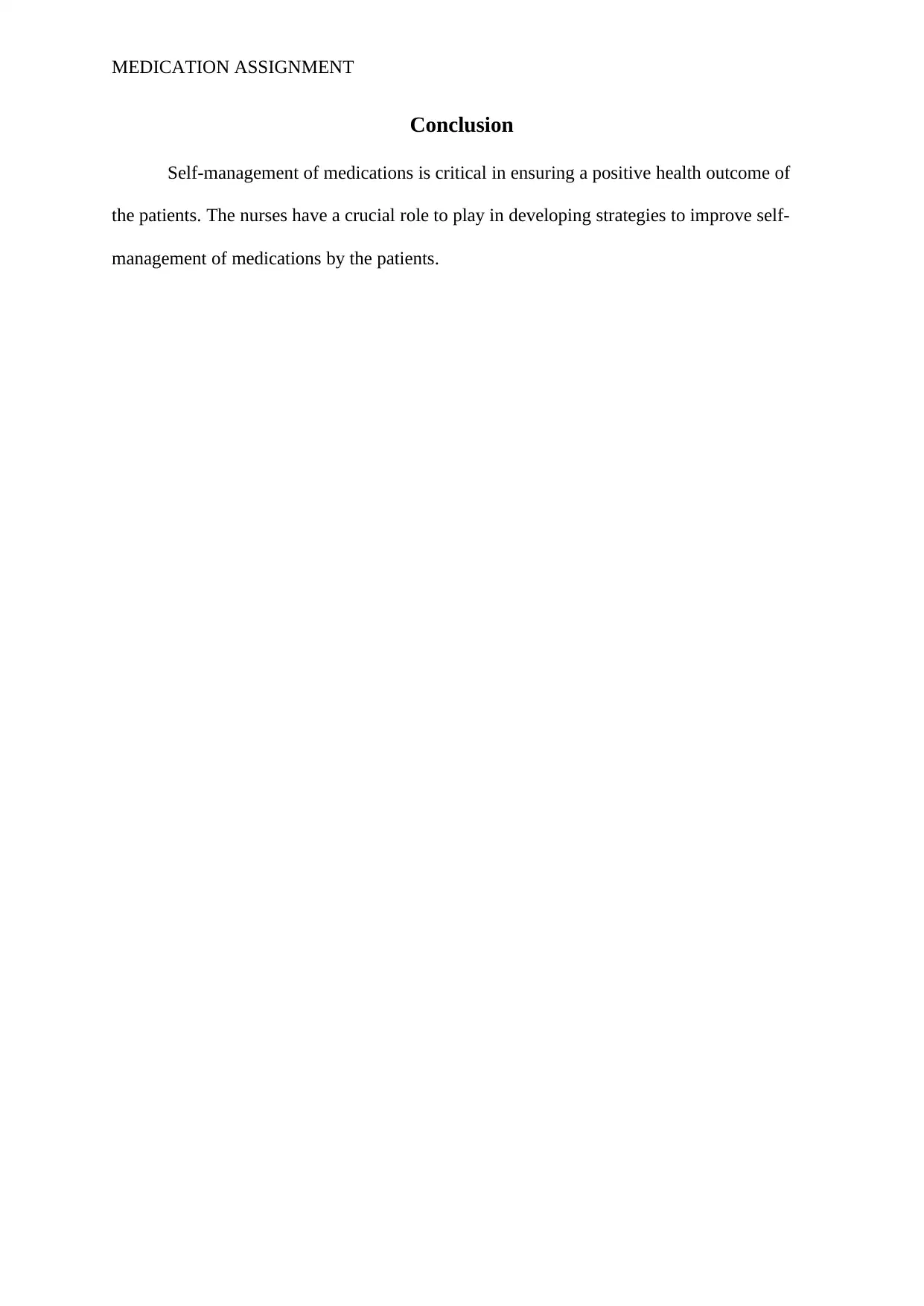
MEDICATION ASSIGNMENT
Conclusion
Self-management of medications is critical in ensuring a positive health outcome of
the patients. The nurses have a crucial role to play in developing strategies to improve self-
management of medications by the patients.
Conclusion
Self-management of medications is critical in ensuring a positive health outcome of
the patients. The nurses have a crucial role to play in developing strategies to improve self-
management of medications by the patients.
⊘ This is a preview!⊘
Do you want full access?
Subscribe today to unlock all pages.

Trusted by 1+ million students worldwide
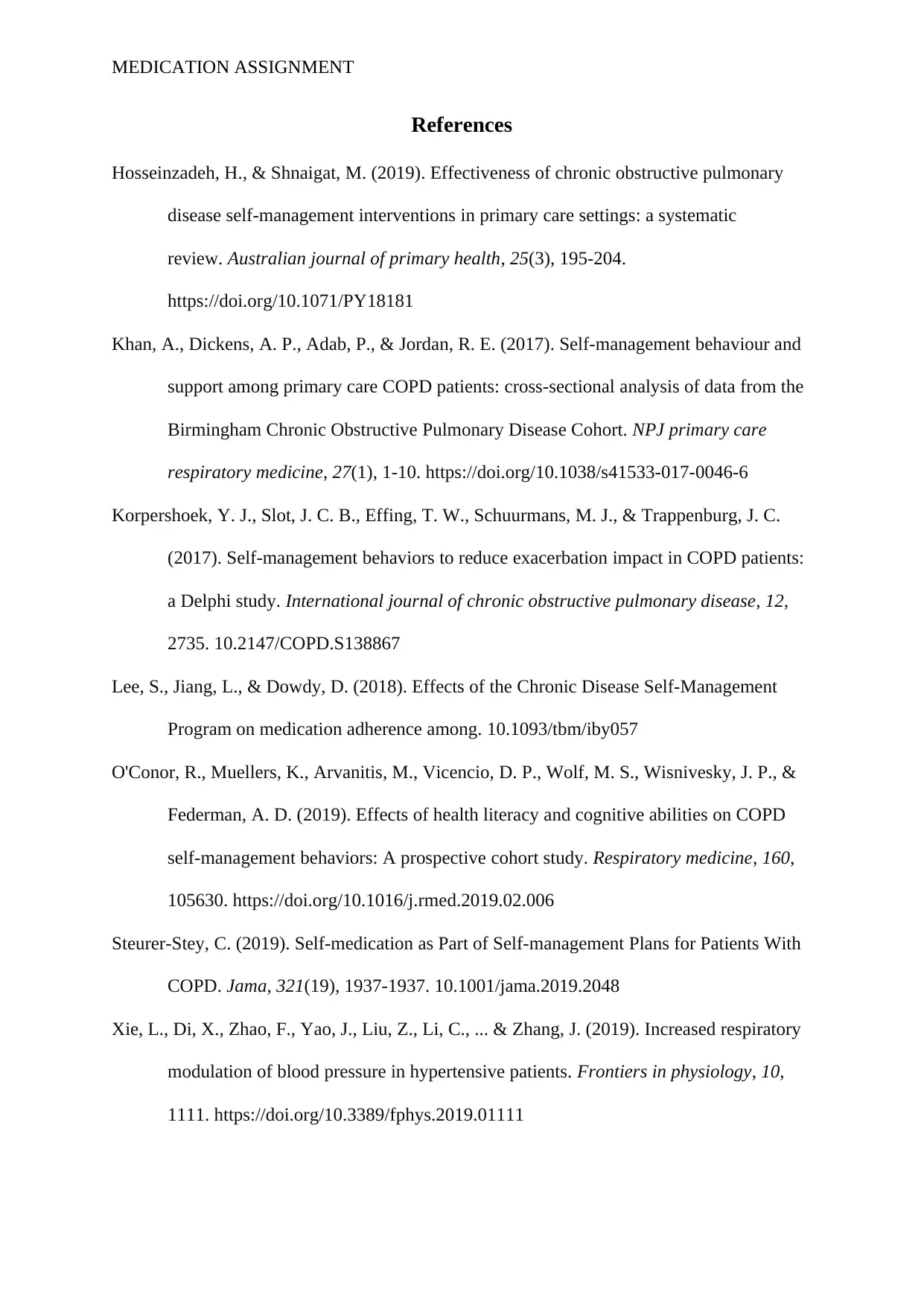
MEDICATION ASSIGNMENT
References
Hosseinzadeh, H., & Shnaigat, M. (2019). Effectiveness of chronic obstructive pulmonary
disease self-management interventions in primary care settings: a systematic
review. Australian journal of primary health, 25(3), 195-204.
https://doi.org/10.1071/PY18181
Khan, A., Dickens, A. P., Adab, P., & Jordan, R. E. (2017). Self-management behaviour and
support among primary care COPD patients: cross-sectional analysis of data from the
Birmingham Chronic Obstructive Pulmonary Disease Cohort. NPJ primary care
respiratory medicine, 27(1), 1-10. https://doi.org/10.1038/s41533-017-0046-6
Korpershoek, Y. J., Slot, J. C. B., Effing, T. W., Schuurmans, M. J., & Trappenburg, J. C.
(2017). Self-management behaviors to reduce exacerbation impact in COPD patients:
a Delphi study. International journal of chronic obstructive pulmonary disease, 12,
2735. 10.2147/COPD.S138867
Lee, S., Jiang, L., & Dowdy, D. (2018). Effects of the Chronic Disease Self-Management
Program on medication adherence among. 10.1093/tbm/iby057
O'Conor, R., Muellers, K., Arvanitis, M., Vicencio, D. P., Wolf, M. S., Wisnivesky, J. P., &
Federman, A. D. (2019). Effects of health literacy and cognitive abilities on COPD
self-management behaviors: A prospective cohort study. Respiratory medicine, 160,
105630. https://doi.org/10.1016/j.rmed.2019.02.006
Steurer-Stey, C. (2019). Self-medication as Part of Self-management Plans for Patients With
COPD. Jama, 321(19), 1937-1937. 10.1001/jama.2019.2048
Xie, L., Di, X., Zhao, F., Yao, J., Liu, Z., Li, C., ... & Zhang, J. (2019). Increased respiratory
modulation of blood pressure in hypertensive patients. Frontiers in physiology, 10,
1111. https://doi.org/10.3389/fphys.2019.01111
References
Hosseinzadeh, H., & Shnaigat, M. (2019). Effectiveness of chronic obstructive pulmonary
disease self-management interventions in primary care settings: a systematic
review. Australian journal of primary health, 25(3), 195-204.
https://doi.org/10.1071/PY18181
Khan, A., Dickens, A. P., Adab, P., & Jordan, R. E. (2017). Self-management behaviour and
support among primary care COPD patients: cross-sectional analysis of data from the
Birmingham Chronic Obstructive Pulmonary Disease Cohort. NPJ primary care
respiratory medicine, 27(1), 1-10. https://doi.org/10.1038/s41533-017-0046-6
Korpershoek, Y. J., Slot, J. C. B., Effing, T. W., Schuurmans, M. J., & Trappenburg, J. C.
(2017). Self-management behaviors to reduce exacerbation impact in COPD patients:
a Delphi study. International journal of chronic obstructive pulmonary disease, 12,
2735. 10.2147/COPD.S138867
Lee, S., Jiang, L., & Dowdy, D. (2018). Effects of the Chronic Disease Self-Management
Program on medication adherence among. 10.1093/tbm/iby057
O'Conor, R., Muellers, K., Arvanitis, M., Vicencio, D. P., Wolf, M. S., Wisnivesky, J. P., &
Federman, A. D. (2019). Effects of health literacy and cognitive abilities on COPD
self-management behaviors: A prospective cohort study. Respiratory medicine, 160,
105630. https://doi.org/10.1016/j.rmed.2019.02.006
Steurer-Stey, C. (2019). Self-medication as Part of Self-management Plans for Patients With
COPD. Jama, 321(19), 1937-1937. 10.1001/jama.2019.2048
Xie, L., Di, X., Zhao, F., Yao, J., Liu, Z., Li, C., ... & Zhang, J. (2019). Increased respiratory
modulation of blood pressure in hypertensive patients. Frontiers in physiology, 10,
1111. https://doi.org/10.3389/fphys.2019.01111
1 out of 7
Related Documents
Your All-in-One AI-Powered Toolkit for Academic Success.
+13062052269
info@desklib.com
Available 24*7 on WhatsApp / Email
![[object Object]](/_next/static/media/star-bottom.7253800d.svg)
Unlock your academic potential
Copyright © 2020–2026 A2Z Services. All Rights Reserved. Developed and managed by ZUCOL.





